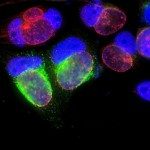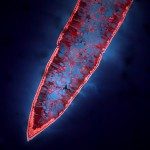Lien vers Pubmed [PMID] – 19858301
Infect. Immun. 2010 Jan;78(1):80-7
Reactive oxygen species (ROS) are many-faceted compounds involved in cell defense against pathogens, as well as in cell signaling. Their involvement in the response to infection in epithelial cells remains poorly documented. Here, we investigated the production of ROS during infection with Chlamydia trachomatis, a strict intracellular pathogen, in HeLa cells. C. trachomatis induced a transient increase in the ROS level within a few hours, followed by a return to basal level 9 hours after infection. At this time point, the host enzyme dedicated to ROS production, NADPH oxidase, could no longer be activated by external stimuli, such as interleukin-1beta. In addition, Rac, a regulatory subunit of the NADPH oxidase complex, was relocated to the membrane of the compartment in which the bacteria develop, the inclusion, while other subunits were not. Altogether, these results indicate that C. trachomatis infection elicits the production of ROS and that the bacteria rapidly target the activity of NADPH oxidase to shut it down. Prevention of ROS production at the onset of the bacterial developmental cycle might delay the host response to infection.

